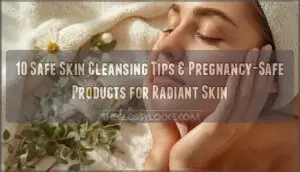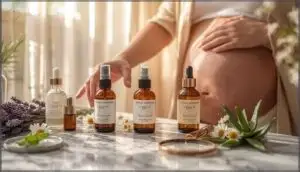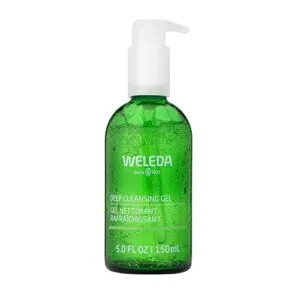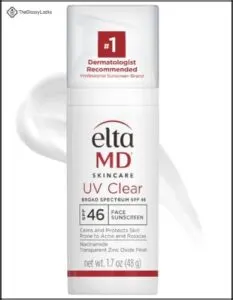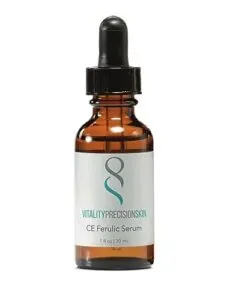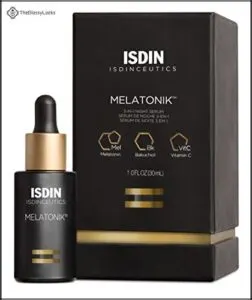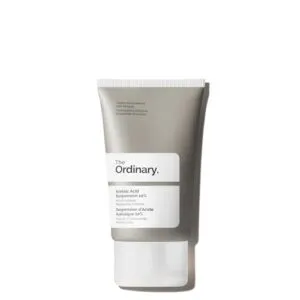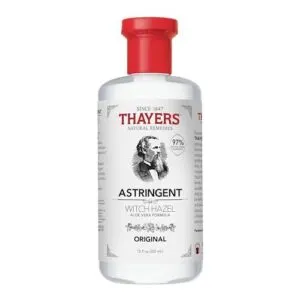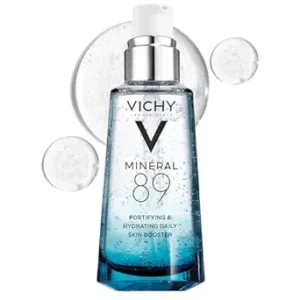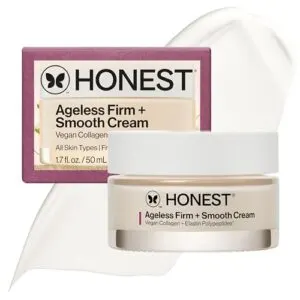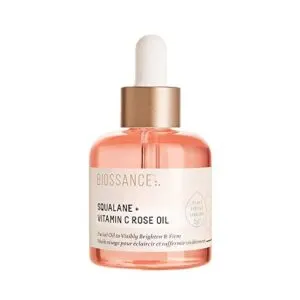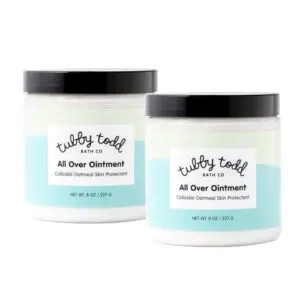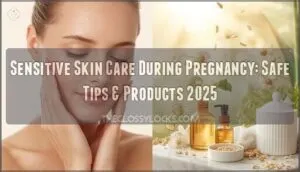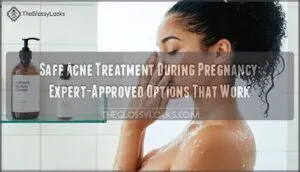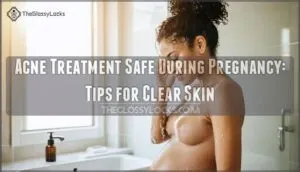This site is supported by our readers. We may earn a commission, at no cost to you, if you purchase through links.
Your skin doesn’t always follow the script when you’re expecting. Maybe you’ve noticed new freckles scattered across your cheeks, or a sudden wave of dryness when your skincare routine hasn’t changed one bit.
For many women, the journey through pregnancy brings a constant guessing game—one day your complexion glows, the next it’s red, tight, or breaking out like you’re back in high school.
Safe skin cleansing during pregnancy isn’t about overhauling everything, but about choosing gentle, effective ingredients that support your body’s changes without compromise. With the right approach, comfort and confidence can stick around long after baby arrives.
Table Of Contents
- Key Skin Changes During Pregnancy
- Ingredients to Avoid for Safe Cleansing
- Safe and Effective Cleansing Ingredients
- Top 10 Pregnancy-Safe Skin Cleansing Products
- 1. Weleda Deep Cleansing Gel Cleanser
- 2. EltaMD UV Clear Face Sunscreen
- 3. Vitality Precision Skin Serum
- 4. Isdin Melatonik Overnight Recovery Serum
- 5. Azelaic Acid Skin Brightening Serum
- 6. Natural Witch Hazel Skin Toner
- 7. Vichy Hydrating Skin Booster Serum
- 8. Vegan Anti Aging Face Cream
- 9. Vitamin C Facial Oil Serum
- 10. Natural Baby Eczema Relief Cream
- Tips for a Gentle Pregnancy Skincare Routine
- Frequently Asked Questions (FAQs)
- Which skincare products are safe for pregnancy?
- Is skin care safe during pregnancy?
- What is the best pregnancy skin care routine?
- How do you take care of your skin during pregnancy?
- Are all skincare products safe during pregnancy & nursing?
- How do I Choose pregnancy-safe skincare?
- Can I use facial cleansing devices while pregnant?
- How often should I cleanse my skin each day?
- Are micellar waters safe for pregnancy use?
- What water temperature is best for cleansing?
- Conclusion
Key Skin Changes During Pregnancy
Pregnancy brings a whirlwind of changes, and your skin is no exception. As your body adapts, you might notice shifts that seem to happen overnight.
Let’s look at the most common skin changes you can expect during this time.
Hormonal Shifts and Their Impact on Skin
Disruption defines pregnancy’s effect on your skin: wild hormonal changes pull strings behind the scenes. Shifts in estrogen and progesterone increase melanin production, causing new pigment spots. Vascular alterations often create redness or visible veins, and skin elasticity rises to accommodate change. Even subtle shifts in your skin barrier function can worsen sensitivity, irritation, or surprise flare-ups. One common issue is hyperpigmentation during pregnancy, which is often triggered by increased hormone levels.
- Changes start early and can evolve
- Melanin production uptick means new spots
- Skin elasticity adjusts to your growing body
- Barrier function shifts make you prone to irritation
Common Pregnancy Skin Concerns (acne, Dryness, Melasma)
Your skin’s mood during pregnancy isn’t random—it’s choreographed by hormonal influence and genetic factors. Acne prevalence spikes, affecting nearly half of expectant women, often surfacing in the first trimester. Melasma prevention can feel like a moving target, especially if there’s a family history.
Meanwhile, pregnancy dryness sneaks in as estrogen shifts, making gentle, safe skincare products your closest allies. Some women may also experience pruritic urticarial papules during pregnancy.
Why Skin Sensitivity Increases During Pregnancy
If you find your skin flipping personalities during pregnancy, you’re not alone. Hormonal fluctuations, immune modulation, and vascular changes all nudge your skin toward unpredictability. Here’s why it feels so sensitive:
- Shifts in skin pH make your barrier more fragile.
- Mechanical stretching causes itchiness and dryness.
- Extra blood flow leads to redness and tenderness.
Ingredients to Avoid for Safe Cleansing
When you’re choosing skincare during pregnancy, a few ingredients deserve special caution. Some common actives and everyday additives aren’t the best match for you and your baby right now.
Here’s what you’ll want to watch for as you read labels.
Risks of Retinoids and Retinol Alternatives
Did you know even small amounts of retinoids during pregnancy can spell big trouble? Retinoid teratogenicity leads to birth defects, which is why regulatory guidelines urge strict avoidance.
Many reach for retinol alternatives, but Bakuchiol safety remains unproven in pregnancy.
For safe skincare options, steer clear of these ingredients—protecting your baby’s future starts with choosing the right cleanser.
Salicylic Acid, Benzoyl Peroxide, and Hydroquinone Concerns
When you’re standing in the skincare aisle, deciphering labels can feel overwhelming—but some choices are clear-cut. Salicylic acid and benzoyl peroxide are labeled pregnancy-safe at low strengths, with the FDA backing careful, spot treatment. Hydroquinone risks, on the other hand, loom larger due to absorption concerns. If you crave peace of mind, safer alternative ingredients are always within reach.
- Fear of harm keeps you up at night.
- Worry bubbles up from laundry lists of ingredient warnings.
- You wish for a science-backed “safe” list.
- Finding gentle, pregnancy-safe skincare becomes a daily quest.
Fragrances, Parabens, and Chemical Sunscreens
Even with the best intentions, fragrance sensitivities, paraben exposure, and chemical absorption can quietly edge into your pregnancy skincare. Regulatory oversight can’t catch everything: over 90% of products for expectant mothers still sneak in parabens or synthetic scents. Opting for fragrance-free, paraben-free cleansers, and mineral sunscreen alternatives keeps your skin cared for—while sidestepping hidden risks.
Choosing fragrance-free cleansers and mineral sunscreens is the safest way to avoid hidden risks in pregnancy skincare
| Ingredient Type | Safer Alternative |
|---|---|
| Fragrance | Fragrancefree cleanser |
| Parabens | Paraben-free formula |
| Chemical Sunscreen | Mineral sunscreen |
How Unsafe Ingredients Can Affect Fetal Development
When certain skincare ingredients slip into your daily routine—think retinoid risks, salicylic concerns, or hydroquinone effects—they do more than just touch your skin. These compounds, along with hidden EDC exposure, can cross the placenta and subtly influence fetal development.
For pregnancy, prioritizing gentle formulas and steering clear of these ingredients dramatically shapes safer product outcomes and peace of mind.
Safe and Effective Cleansing Ingredients
Choosing the right ingredients for cleansing during pregnancy can make all the difference in how your skin feels and looks. Some options keep your skin calm, hydrated, and protected, while others go the extra mile for your skin’s radiance.
Let’s take a closer look at what’s safe and works best for you.
Benefits of Fragrance-free and Gentle Cleansers
It’s amazing how much your skin can change in pregnancy. Choosing gentle, fragrance-free cleansers is like wrapping your skin in a soft blanket—it helps fend off redness, itching, and the lingering effects of strong scents. These safe skincare ingredients protect your barrier function and lower allergy risk, while also keeping endocrine disruptors at bay for both you and your baby.
- Dramatically reduced irritation and fewer flare-ups
- Promotes healthy skin barrier function in pregnancy
- Lowers allergenic potential and contact dermatitis risk
- Soothes heightened odor sensitivity from fragrances
- Minimizes exposure to hidden endocrine disruptors
Role of Vitamin C, Niacinamide, and Azelaic Acid
Think of Vitamin C, Niacinamide, and Azelaic Acid as the three anchors of pregnancy skincare—they gently brighten, calm, and clarify without stirring up trouble.
These safe skincare ingredients help fade dark spots and manage acne, and their combined efficacy delivers visible results faster.
Using each as recommended promotes your natural glow, barrier health, and confidence throughout pregnancy.
Bakuchiol as a Retinol Alternative
Bakuchiol safety makes it your go-to retinol alternative during pregnancy—it brightens and smooths without binding to retinoic acid receptors, sidestepping teratogenic risk entirely.
Clinical data shows bakuchiol rivals retinol’s anti-aging benefits with far fewer adverse effects like scaling or burning. Expert opinions confirm it’s likely safe, though pregnancy-specific trials don’t exist. Consider these pregnancy-safe ingredients for gentle cleansing:
- Reduces hyperpigmentation and wrinkles effectively
- No photosensitivity or systemic absorption reported
- Minimal stinging, even for eczema-prone skin
- Regulatory bodies issue no warnings against use
- Dermatologists recommend consulting your OB-GYN first
PHAs and Glycolic Acid for Gentle Exfoliation
PHAs and glycolic acid (at 10% or lower) offer gentle exfoliation during pregnancy with clinical efficacy for acne and melasma—common concerns when you’re expecting.
Glycolic absorption remains minimal, making it relatively safe, while PHA benefits include enhanced hydration and comparative safety for sensitive skin.
Always check product guidelines for concentration limits, and consult your provider before adding any new facial cleanser or exfoliation treatment to your skin care routine.
Importance of Mineral Sunscreens in Daily Routine
Beyond exfoliation, your skin needs broad-spectrum coverage to prevent melasma—a concern for up to 50% of pregnant women. Mineral sunscreen with zinc oxide or titanium dioxide offers enhanced fetal safety since it creates a physical barrier without systemic absorption.
Dermatologist recommendations consistently favor mineral formulations during pregnancy, protecting your skin barrier while reducing pigmentation risk by 54% compared to no sun protection.
Top 10 Pregnancy-Safe Skin Cleansing Products
Now that you know which ingredients to look for, it’s time to talk about the products that deliver them safely.
I’ve curated a list of ten pregnancy-safe skincare essentials that address everything from cleansing to sun protection without compromising your baby’s health. These recommendations are backed by ingredient safety profiles and designed to work with your changing skin.
1. Weleda Deep Cleansing Gel Cleanser
When you’re dealing with pregnancy skincare, you need a cleanser that works without compromise. Weleda Deep Cleansing Gel stands out with clinical efficacy that backs its gentle approach—89% of users confirmed thorough cleansing in clinical studies.
The Weleda ingredients include aloe vera and witch hazel, all pregnancy-safe and free from retinoids or parabens. Consumer trends show rising demand for vegan cleansers, but note the allergen risks from natural fragrances if you’re sensitive.
Its NaTrue and Vegan product certifications confirm it’s among the safest gentle cleansers available.
Best For: Pregnant individuals or those with sensitive skin seeking a thoroughly tested, vegan cleanser that removes impurities without harsh chemicals or pregnancy-risky ingredients.
- Clinically proven effective with 89% of users confirming thorough cleansing and 88% reporting soft, supple skin after use.
- Free from pregnancy-concern ingredients like retinoids, parabens, and synthetic preservatives, with NaTrue and Vegan certifications backing its safety.
- Suitable for daily use on all skin types with minimal irritation risk—fewer than 2% of users reported any reaction.
- Natural fragrance compounds like limonene and citral may trigger reactions in those with heightened sensitivity or plant allergies.
- Not specifically formulated for acne-prone skin, and some users have reported breakouts.
- Packaging could be more eco-friendly despite being recyclable HDPE plastic.
2. EltaMD UV Clear Face Sunscreen
Moving to sun protection, EltaMD UV Clear Broad-Spectrum SPF 46 consistently tops pregnancy skincare recommendations from dermatologist-approved sources. This mineral sunscreen uses 9% zinc oxide for broad-spectrum SPF protection without hormone risks—critical for preventing melasma during pregnancy.
Niacinamide benefits include calming inflammation and acne prevention, addressing hormonally-triggered breakouts you’re likely experiencing. It’s oil-free, fragrance-free, and noncomedogenic.
While pricier than drugstore options, its safety profile and effectiveness for skincare during pregnancy make it a foundational sunscreen recommendation worth the investment.
Best For: Pregnant individuals and those with sensitive or acne-prone skin who need dermatologist-recommended sun protection that won’t trigger breakouts or worsen melasma.
- Mineral-based zinc oxide formula is considered safe during pregnancy with no known reproductive risks, plus niacinamide helps calm hormonal breakouts and inflammation.
- Broad-spectrum SPF 46 provides excellent protection against melasma and hyperpigmentation, which are common during pregnancy due to hormonal changes.
- Oil-free, fragrance-free, and noncomedogenic formula works well under makeup and won’t clog pores or irritate sensitive pregnancy skin.
- Significantly more expensive than most drugstore sunscreens, which adds up with daily use throughout pregnancy.
- Small 1.7 oz bottle size means you’ll need to repurchase frequently, especially if applying to face, neck, and chest.
- Some users report pump mechanism failures, and the formula may leave a slight white cast depending on your skin tone.
3. Vitality Precision Skin Serum
For addressing dullness and fine lines without retinol, Vitality Precision Skin Serum delivers measurable benefits through its 15% L-Ascorbic Acid and octapeptide blend. Clinical studies show 63% wrinkle reduction and 27% improved hydration—impressive facial radiance without pregnancy safety concerns.
The gentle formula contains niacinamide, vitamin C, and squalane (all pregnancy-safe skincare ingredients) while avoiding retinoids, parabens, and chemical sunscreens you need to skip. It aids skin renewal and barrier function during pregnancy, though some users find the applicator messy.
At $49, it’s an evidence-backed option for skincare during pregnancy when you’re prioritizing both efficacy and safety.
Best For: Pregnant individuals seeking clinically proven brightening and anti-aging results without retinoids or harsh ingredients.
- Clinically demonstrated 63% wrinkle reduction and 27% hydration boost in 12 weeks, with pregnancy-safe ingredients like niacinamide and vitamin C.
- Free from retinoids, parabens, and chemical sunscreens—tested safe across all skin types with no serious adverse effects reported.
- Strong value at $49 with dermatologist-backed formula showing measurable improvements in skin tone, elasticity, and barrier function.
- Applicator design can be messy and imprecise during application, according to customer feedback.
- Ferulic acid may produce an odd smell that some users find off-putting, though it’s essential for the formula’s stability.
- Results vary by individual—one customer reported clogged pores and no visible improvement despite consistent use.
4. Isdin Melatonik Overnight Recovery Serum
If nighttime repair appeals to you, ISDIN Melatonik Night Serum combines melatonin benefits, bakuchiol effects, and vitamin C role for skin rejuvenation during overnight recovery. Clinical data shows 11% wrinkle reduction and 70% less redness—meaningful improvements with pregnancy-safe ingredients like bakuchiol (a gentle retinol alternative) and vitamin C.
However, no published studies confirm topical melatonin safety during pregnancy, and the formula includes fragrance and alcohol that may irritate sensitive skin. At $175, consult your provider before adding this to your skincare during pregnancy routine, especially given the unknowns around melatonin absorption.
Best For: Adults looking for an overnight serum that hydrates, improves skin firmness, and targets early signs of aging with gentle, research-backed ingredients.
- Noticeably reduces wrinkles, redness, and boosts firmness over time.
- Lightweight, non-greasy formula that feels comfortable for nightly use.
- Suitable for most skin types, including dry, normal, and combination.
- High price point at $175 may be a barrier for many.
- Results may take several weeks, requiring patience.
- Contains retinol, fragrance, and alcohol, so may not suit sensitive or pregnant users without medical advice.
5. Azelaic Acid Skin Brightening Serum
For hyperpigmentation reduction and acne treatment during pregnancy, The Ordinary’s Azelaic Acid Suspension 10% delivers clinical efficacy at just $12.20. This pregnancy-safe skincare option targets dark spots and acne treatment with FDA Category B approval—meaning no proven fetal risks.
Dermatologists routinely recommend it because serum absorption stays under 10%, minimizing systemic exposure. Apply morning or evening after cleansing; you’ll notice smoother texture within weeks. While some experience mild stinging initially, pairing it with moisturizer helps.
Follow usage guidelines by starting gradually, especially during your first trimester.
Best For: Pregnant individuals seeking a dermatologist-recommended solution for hyperpigmentation, acne scars, and breakouts without exposure to harsh ingredients like retinoids or hydroquinone.
- FDA Category B pregnancy-safe with under 10% skin absorption, making it one of the safest topical treatments for acne and dark spots during pregnancy.
- Addresses multiple concerns at once—reduces hyperpigmentation, controls oil production, smooths texture, and prevents new breakouts with consistent use.
- Affordable at $12.20 with a gentle, fragrance-free formula suitable for daily use and compatible with most skincare routines.
- May cause initial irritation or stinging, particularly for sensitive skin types, requiring gradual introduction and pairing with moisturizer.
- Results take several weeks of consistent use to become noticeable, so it’s not a quick fix for urgent skincare concerns.
- Some users report quality control issues like half-empty bottles or an unpleasant smell that can be off-putting.
6. Natural Witch Hazel Skin Toner
When pregnancy hormones trigger excess oil and inflammation, Thayers Alcohol-Free Witch Hazel Toner offers gentle relief with 98% natural ingredients. This pregnancy-safe skincare staple controls sebum without stripping your skin barrier—important when you’re already dealing with heightened sensitivity.
The alcohol-free formula ensures toner safety, while aloe vera adds hydration that many gentle cleansers lack. Application guidelines are simple: sweep across clean skin with a cotton pad, then follow immediately with moisturizer.
Over 12,000 user experiences confirm its effectiveness for pore refinement during pregnancy, though patch-testing remains wise.
Best For: Pregnant women experiencing hormonal acne, excess oil, or inflammation who want a gentle, natural toner that won’t irritate sensitive skin.
- 98% natural, alcohol-free formula with aloe vera provides effective oil control without drying or stripping your skin barrier during pregnancy.
- Over 12,000 positive reviews confirm it helps refine pores and reduce inflammation while being gentle enough for pregnancy-sensitive skin.
- Simple application and pregnancy-safe ingredients (no parabens, synthetic fragrances, or harsh alcohols) make it an easy addition to your routine.
- May cause slight tightness or dryness in some users, requiring immediate moisturizer application afterward.
- Not all formulas are alcohol-free—you need to specifically choose the alcohol-free version to avoid the 10% alcohol content in standard formulas.
- Limited formal pregnancy safety studies exist, so patch testing is recommended despite its long history of safe topical use.
7. Vichy Hydrating Skin Booster Serum
Your skin barrier works overtime during pregnancy, which is why Vichy’s Hydrating Skin Booster Serum earns consistent praise for hydration efficacy. Clinical trials with over 1,600 women showed a 64% improvement in dryness within four weeks—impressive for pregnancy-safe skincare.
The hyaluronic acid formula contains only 13 ingredients, free from parabens and fragrance, making it ideal for sensitive skin. User satisfaction rates remain high, with 75% reporting sufficiently hydrated skin.
This ingredient safety profile meets strict pregnancy skincare standards, and the fast-absorbing texture layers beautifully under safe skincare products.
Best For: Pregnant women and those with sensitive skin who need a lightweight, clinically-tested hydrating serum that absorbs quickly and layers well under other products.
- Clinically proven to reduce dryness by 64% in four weeks, with over 1,600 women tested showing significant improvements in hydration and skin barrier function.
- Clean, minimal formula with only 13 ingredients—free from parabens, fragrance, silicones, and sulfates—making it safe for pregnancy and sensitive skin types.
- Fast-absorbing water-gel texture that doesn’t leave residue, allowing it to layer seamlessly under moisturizers and SPF for a complete skincare routine.
- Needs a moisturizer on top since it works as a hydrating serum rather than a standalone product, which means an extra step in your routine.
- At $29.99–$37.53, it’s pricier than drugstore alternatives, though the clinical backing and clean formula may justify the cost.
- Results require consistent twice-daily use for at least a week, so it’s not an instant fix if you’re looking for immediate plumping effects.
8. Vegan Anti Aging Face Cream
You’ll find few pregnancy-safe antiaging options that match the clinical results of vegan cream formulations. Honest Beauty’s Vegan Anti Aging Face Cream delivers both firmness and hydration through plant-based peptides and dual hyaluronic acid—ingredients confirmed safe during pregnancy since they don’t cross the placental barrier.
Clinical trials show 92% of users experienced smoother skin within one month. The fragrance-free, EWG Verified formula targets fine lines while meeting strict pregnancy-safe skincare standards, making it a gentle yet effective choice for expecting mothers seeking antiaging benefits.
Best For: Expecting mothers and anyone with sensitive skin looking for a clinically-tested, fragrance-free antiaging cream that delivers real results without harsh chemicals.
- Clinical trials show 92% of users saw smoother skin and 96% experienced better hydration after just one month of use.
- Pregnancy-safe formula with vegan collagen peptides and dual hyaluronic acid that won’t cross the placental barrier.
- EWG Verified and fragrance-free, making it gentle enough for sensitive skin while still tackling fine lines and wrinkles.
- Some users find the texture thick and harder to spread compared to lighter moisturizers.
- At $29.99 for 1.7 oz, it’s pricier than many drugstore antiaging creams.
- A few reviewers noticed inconsistent results, with one reporting possible formula changes in recent batches.
9. Vitamin C Facial Oil Serum
Biossance’s Vitamin C Facial Oil Serum stands out for its pregnancy-safe formulation, combining brightening l-ascorbic acid with deeply hydrating squalane.
This lightweight serum treats melasma—a concern affecting up to 50% of pregnant individuals—by inhibiting tyrosinase and reducing melanin production by over 60% in clinical studies. The oil-based formula enhances absorption by 30% compared to water-based versions, delivering antioxidant protection against environmental stressors.
With dermatologists ranking vitamin C serums among their top three pregnancy-safe recommendations, this fragrance-free option promotes collagen synthesis while maintaining skin barrier integrity throughout your pregnancy journey.
Best For: Pregnant individuals seeking a dermatologist-recommended vitamin C serum that brightens skin, treats melasma, and delivers deep hydration with a pregnancy-safe formula.
- Instantly boosts radiance and hydration with stabilized vitamin C and squalane oil.
- Clinically proven to reduce hyperpigmentation and improve skin tone during pregnancy.
- Lightweight, fragrance-free, and suitable for all skin types.
- Pricey compared to similar serums on the market.
- Dropper may not reach all the product at the bottom of the bottle.
- Some users report minor irritation or changes in formula/scent over time.
10. Natural Baby Eczema Relief Cream
For little ones comforted by gentle, nourishing care, a natural baby eczema relief cream can make all the difference—especially if you’re keen on pregnancy-safe skincare for your family. Crafted with Eczema Cream Ingredients like colloidal oatmeal and botanical oils, these formulas soothe dry, irritated baby skin without steroids or synthetic irritants.
Cream Efficacy Studies show 94% of infants find relief with daily use.
As market growth trends highlight, parents now seek natural ingredients and scrutinize allergen considerations to care for sensitive skin safely.
Best For: Parents of babies and young children with sensitive, eczema-prone skin seeking a gentle, natural, and steroid-free moisturizer.
- Soothes and relieves eczema and irritations with 1% colloidal oatmeal and botanical ingredients.
- Thick, rich, non-greasy formula tested by pediatricians and dermatologists for safety.
- Fragrance-free, steroid-free, and suitable for daily use on babies and adults alike.
- May be more expensive compared to basic moisturizers or generic creams.
- Not suitable for those with allergies or sensitivities to specific plant-based or inactive ingredients.
- Consistent, ongoing use is needed to maintain results and some severe cases may need medical consultation.
Tips for a Gentle Pregnancy Skincare Routine
Caring for your skin during pregnancy doesn’t have to feel overwhelming. The right habits can help you stay comfortable, confident, and safe.
Here’s how to create a gentle routine that meets your changing needs.
Establishing a Safe Morning and Evening Routine
Every morning and evening, a gentle skincare routine during pregnancy keeps your skin balanced and calm. Here’s a straightforward 5-step formula for pregnancy-safe skincare:
- Cleanse with a mild, fragrance-free facial cleanser.
- Mist or tone for hydration.
- Apply recommended serums.
- Moisturize with safe ingredients.
- Finish with mineral sunscreen in the morning.
Focus on routine fundamentals, application order, and a supportive home environment.
Managing Acne and Hyperpigmentation Safely
If pregnancy triggers breakouts or melasma, you aren’t alone. Stick to Safe Actives—azelaic acid and niacinamide work well for pregnancy-safe acne treatment and Melasma Reduction.
Mineral-based Sun Protection guards against pigment worsening; it’s smart skincare, not just sunscreen.
When over-the-counter options feel limiting, seek Dermatologist Advice for specific solutions that protect your glow throughout pregnancy.
Maintaining Skin Barrier Health and Hydration
Although hormonal changes can nudge your skin’s barrier off balance, you have plenty of ways to defend it. Protecting against TEWL (transepidermal water loss) and replenishing lost lipids pays dividends for comfort and glow. Here’s how to keep hydration locked in and your skin barrier resilient:
- Choose gentle, fragrance-free moisturizers for daily use.
- Limit hot showers to prevent excess dryness.
- Apply moisturizer right after cleansing for best hydration.
- Integrate gentle exfoliation with PHAs, avoiding harsh scrubs.
- Use a humidifier at night to maintain healthy skin moisture.
When to Consult a Dermatologist During Pregnancy
Wondering when to call in a pro? If you’re battling worsening skin issues, notice rapid changes in spots or moles, or struggle with severe symptoms that just won’t quit, a dermatologist’s advice on skincare is vital.
Early referral can reveal systemic risks and help guarantee dermatologist-approved solutions—especially in pregnancy, when specialist recommendations protect both your health and your baby’s.
Frequently Asked Questions (FAQs)
Which skincare products are safe for pregnancy?
It might surprise you, but not all dermatologist recommendations are created equal—ingredient safety and product efficacy matter most.
Look for fragrance-free cleansers, mineral sunscreens, vitamin C, niacinamide, bakuchiol, and azelaic acid in pregnancy-safe skincare products, especially while breastfeeding.
Is skin care safe during pregnancy?
Yes—pregnancy skincare safety depends on knowing which ingredients to avoid. While many pregnancy-safe skincare ingredients have minimal absorption rates, others carry fetal development risks.
Prioritizing thorough product ingredient research and dermatologist consultation ensures your routine remains safe and effective.
What is the best pregnancy skin care routine?
For the best pregnancy skin care routine, focus on gentle cleansing twice daily, layer fragrance-free moisturizers, prioritize mineral sunscreen, and incorporate safe actives like niacinamide—adapted to your specific needs, budget, and dermatologist recommendations for pregnancy-safe skincare.
How do you take care of your skin during pregnancy?
To care for your skin during pregnancy, prioritize a gentle cleansing routine, use pregnancy-safe skincare products, choose hydrating ingredients, and opt for minerals over chemicals.
Always read labels, and consult your dermatologist for safe ingredient choices if in doubt.
Are all skincare products safe during pregnancy & nursing?
Not all skincare products are safe for pregnancy or nursing. Ingredient absorption rates matter—retinoids, hydroquinone, and chemical sunscreens can pose fetal health risks.
Regulatory oversight is needed, so always review product ingredient safety and follow dermatologist recommendations for pregnancy-safe skincare.
How do I Choose pregnancy-safe skincare?
Imagine picking apples—some are safe, others hide worms. Choosing pregnancy-safe skincare means diligent ingredient research, label reading, and product testing.
Prioritize brand transparency and help pregnancy-safe ingredients truly support your skin’s unique pregnancy journey.
Can I use facial cleansing devices while pregnant?
You can use facial cleansing devices during pregnancy, but expert recommendations stress caution. Device safety is uncertain—adverse reactions are more common, especially with frequent use.
Safer alternatives include manual facial cleansing and makeup removal, using a gentle cleansing routine.
How often should I cleanse my skin each day?
As the saying goes, “Less is more.” Cleansing Frequency matters—stick to face wash once or twice daily, adjusting for Skin Type and Pregnancy Stage.
Over-Cleansing Risks include dryness and irritation, so prioritize a gentle cleansing routine and thoughtful Product Selection.
Are micellar waters safe for pregnancy use?
Micellar water is well-supported for use during pregnancy. Its low ingredient absorption rates and gentle cleansing routine make it a favorable choice, as recommended by dermatologists.
When selecting micellar water with pregnancy-safe ingredients, the risk of chemical exposure is minimal. This makes micellar water one of the safest skincare products available for expectant mothers.
What water temperature is best for cleansing?
The ideal temperature for gentle cleansing is lukewarm—close to body temperature, around 6°F. Hot water risks skin sensitivity and overheating dangers, while cold water effects include less effective cleansing. Lukewarm benefits support a pregnancy-safe skincare routine.
Conclusion
Imagine your skin as a garden, responding to new seasons during pregnancy. Safe skin cleansing during pregnancy is like tending this garden with gentle hands—choosing nourishing elements, removing what could harm, and letting resilience bloom.
Each product and tip acts as water, sunlight, or shade, guiding your skin through unpredictable weather.
Trust that with mindful care, your complexion will flourish, reflecting the strength and grace of your journey, both now and in the radiant days ahead.
- https://pmc.ncbi.nlm.nih.gov/articles/PMC8884185/
- https://www.bouldermedicalcenter.com/safe-skincare-pregnant/
- https://www.aad.org/public/everyday-care/skin-care-secrets/routine/pregnancy-skin-care
- https://onlinelibrary.wiley.com/doi/10.1111/jocd.70132
- https://www.thebump.com/a/top-6-annoying-pregnancy-skin-issues-how-to-deal

